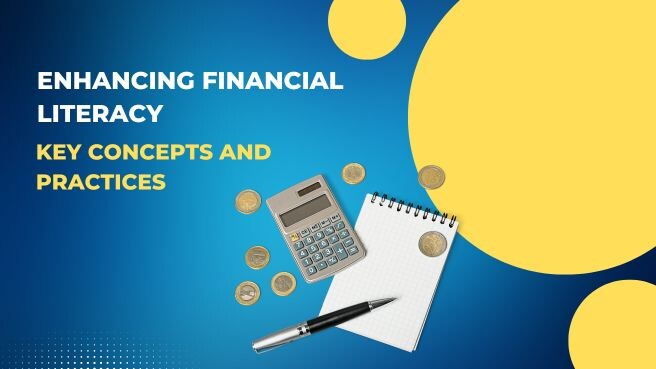Enhancing Financial Literacy: Key Concepts and Practices

Financial literacy is generally referred to as the understanding and capability to make wise, informed, profound and efficient decisions about personal financial resources. It usually encompasses the knowledge of how capital works in the world: the process of how it is earned, managed, and invested to meet people’s needs and goals. Prior to availing a personal loan, one must exhibit good financial literacy.
Financial Literacy Concepts
Budgeting and Cash Flow Management
Certain crucial factors related to financial literacy is the ability to organize and manage one’s finances through informed budgeting. It ensures that the individuals set spending limits, allocating funds to different needs, and prioritize the necessary essentials.
To understand the cash flow is equally significant, involving the methodical monitoring of income versus expenses. Once an individual has mastered this, one can ensure they live within their means, while saving efficiently, and plan for financial uncertainties.
A systematic cash flow management also assists in preventing unmanageable debts and promotes proactive financial behavior.
Saving and Investing
As most people comprehend the basic concept of saving, financial literacy dives deeper into the significance and strategies of saving effectively and efficiently. Such means are not just setting aside money but also to enhance and optimize the growth of these savings.
To invest is to complement saving; it is about allocating resources to instruments or assets for instance stocks, bonds, or real estate that can possibly yield returns over a certain period of time. Comprehending the principles of risk, return, and diversification in investing can necessarily pave the way for long-term financial growth along with the security.
Credit and Debt
To procure a personal loan, being financially literate is a crucial factor to make informed decisions. Financial literacy means comprehending the mechanics of credit—how rates of interest work, the implications of numerous loan terms, and the impact of one’s credit score on borrowing abilities. It also means knowing how to manage and reduce debt judiciously.
Uncontrolled debt can curl into financial distress, so it is vital to have strategies to handle it.
Insurance and Risk Management
There are oftentimes when life is unpredictable, and for the same the financial literacy encompasses preparing for these uncertainties. Insurance products provide protection against unpredicted financial blows, be it either from health issues, accidents, or natural disasters.
Comprehending the various types of insurance available, their multiple terms, and benefits can make the difference between financial stability and upheaval during challenging times.
Risk management, in a broader sense, also includes the following recognizing potential financial pitfalls and taking steps to mitigate them.
Financial Products and Services
The financial world is copious with tools designed to assist individuals grow, save, and manage their wealth. From basic savings accounts to convoluted financial instruments such as the derivatives, knowing how to mitigate this landscape is important.
Financial literacy sanctions individuals to discern which products align with their desired goals, managing personal loans and how to avoid pitfalls and fees associated with certain services.
Tax Planning
Taxes, while inescapable, can be optimized with genuine and proper knowledge. Financial literacy requires the understanding of the tax code to a certain extent, especially areas relevant to one’s financial situation.
Retirement Planning
Retirement planning often seems distant to many, however the foundations for a comfortable retirement begin early. Financial literacy is frequently equipped with individuals with the knowledge to conceive retirement strategies and comprehending the value of pensions, 401(k)s, IRAs, and other retirement savings tools.
It also enhances the requirement for regular contributions and the advantages of compound interest over a period of time.
Building Wealth and Asset Management
Financial literacy also incorporates strategies for expanding one’s net worth over time. It consists of understanding the principles of asset allocation, diversification, as well as the value of reinvesting returns.
Sufficient wealth and asset management can essentially lead to financial freedom, allowing numerous individuals to achieve their long-term goals and leave a legacy.

